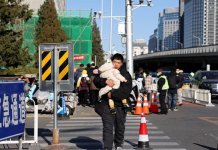Separately, Prime Minister Shehbaz has also called for a dinner with members of the governing coalition
Mehtab Pirzada
ISLAMABAD: President Asif Ali Zardari is set to host a dinner for the Pakistan People’s Party (PPP) and its coalition allies on Tuesday, sources revealed.
The event is expected to include senators, members of the National Assembly, provincial governors, and chief ministers.
Additionally, political parties including the Awami National Party (ANP), Muttahida Qaumi Movement (MQM), and the Istehkam-e-Pakistan Party (IPP) have also been invited to attend.
Separately, Prime Minister Shehbaz Sharif has called for a dinner with members of allied parliamentary parties the same evening.
Sources indicate that the Jamiat Ulema-e-Islam-Fazl (JUI-F) has also been extended an invitation, though it has yet to confirm participation.
The prime minister is expected to brief coalition members on the country’s economic situation and proposed legislative reforms.
Government insiders say these reforms may include a constitutional amendment aimed at increasing the number of judges.
Amid judicial politics and a growing rift in the apex court, the upper house of parliament had referred a private member’s bill to one of its committees. The bill sought to increase the number of judges in the Supreme Court from 17 to 21.
On July 12, this bench revived the PTI as a parliamentary party and paved the way for it to reclaim reserved seats in the national and provincial legislatures.
The majority order was endorsed by eight Supreme Court judges, while five members, including Chief Justice of Pakistan Qazi Faez Isa, wrote dissenting notes.
If more “like-minded” judges are appointed to the Supreme Court following an amendment, and the government’s review petition is heard by an “enlarged” full court, the tables could be turned on the PTI, which otherwise would become the largest party in parliament.
Against this backdrop, independent lawmaker Senator Abdul Qadir presented the bill in the Senate on Monday. The proposal suggests raising the number of judges, excluding the chief justice, to 20.
According to Qadir, thousands of cases are stuck in the Supreme Court, which lacks the capacity to address them. He noted that the judicial system is overloaded from the bottom up.
“Currently, over 53,000 cases are pending in the Supreme Court, and it takes two years for a case to be heard. Therefore, increasing the number of judges is crucial. The number of judges is insufficient, and the population is growing,” he said.
On September 3, the National Assembly suspended a motion proposing an increase in the number of Supreme Court judges.
















